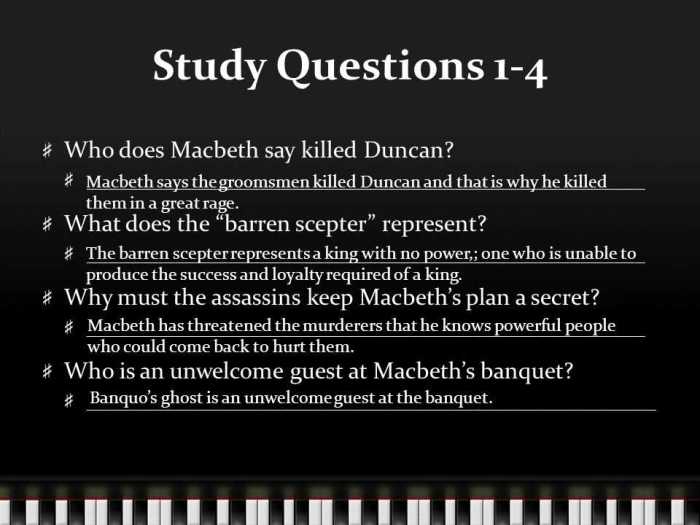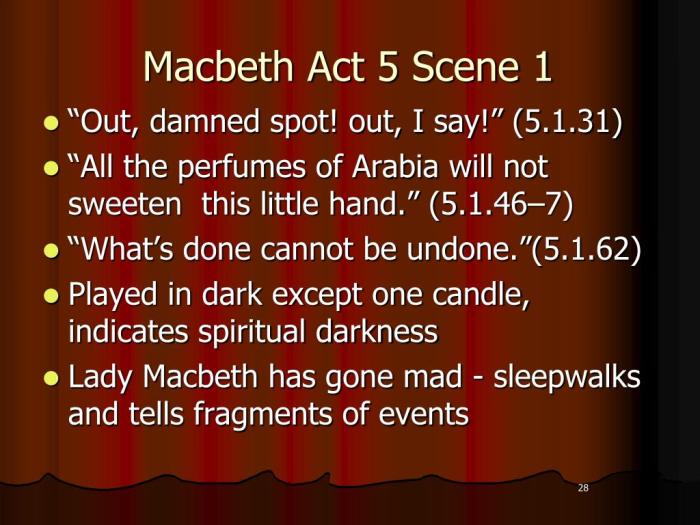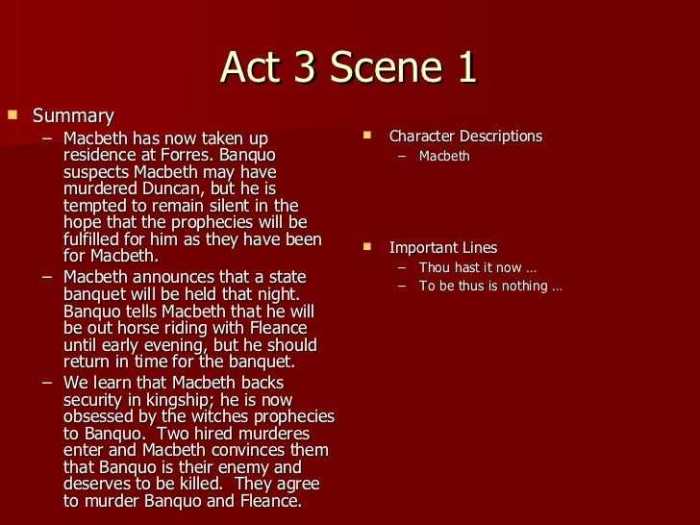Macbeth act 3 questions and answers pdf – Journey into the depths of Shakespeare’s “Macbeth,” Act 3, through our comprehensive PDF guide, which provides insightful answers to commonly asked questions. This guide delves into the play’s pivotal turning point, exploring key events, character transformations, and the interplay of themes and symbols.
Act 3 of “Macbeth” marks a crucial juncture in the narrative, as the consequences of Macbeth’s ambition unfold with increasing intensity. The murder of Banquo, the witches’ prophecies, and the haunting banquet scene all contribute to a profound shift in the play’s atmosphere and the characters’ fates.
Macbeth Act 3 Overview
Act 3 of Macbeth is a pivotal turning point in the play, marking Macbeth’s descent into tyranny and madness. It begins with the murder of Banquo, Macbeth’s former friend and rival, and culminates in the infamous banquet scene, where Macbeth’s guilt and paranoia manifest in hallucinations.
Key Events in Act 3
The Murder of Banquo
Macbeth, driven by ambition and fear, hires assassins to murder Banquo and his son, Fleance. The assassination is successful, but Fleance escapes, leaving Macbeth haunted by the prophecy that Banquo’s descendants will inherit the throne.
The Witches’ Prophecy
After the murder, Macbeth encounters the witches again. They give him three prophecies: that he will be defeated by someone “not of woman born,” that he will be safe until Birnam Wood comes to Dunsinane Hill, and that he will not be vanquished until “Great Birnam Wood to high Dunsinane Hill / Shall come against him.”
Macbeth takes comfort in these prophecies, believing they make him invincible.
The Banquet Scene
Macbeth hosts a banquet to celebrate his reign. However, he is plagued by guilt and paranoia. He sees the ghost of Banquo sitting at the table and becomes increasingly agitated. The guests are horrified, and Lady Macbeth tries to cover for him, but Macbeth’s behavior only becomes more erratic.
Character Analysis: Macbeth and Lady Macbeth

Macbeth’s Descent into Madness
Act 3 marks a significant turning point in Macbeth’s character. Driven by ambition, he commits murder and becomes increasingly ruthless and tyrannical. His guilt and paranoia consume him, leading to hallucinations and a loss of grip on reality.
Lady Macbeth’s Role in the Murders
Lady Macbeth plays a pivotal role in the murder of Duncan. She is ambitious and ruthless, pushing Macbeth to commit the crime. However, her guilt and remorse begin to take their toll in Act 3. She becomes increasingly withdrawn and mentally unstable.
Comparison of Macbeth and Lady Macbeth, Macbeth act 3 questions and answers pdf
Macbeth and Lady Macbeth are two complex and tragic characters. Macbeth is driven by ambition, while Lady Macbeth is driven by a desire for power. Both characters are consumed by guilt and remorse, but Lady Macbeth’s descent into madness is more gradual and subtle than Macbeth’s.
Themes in Act 3

Ambition and Its Consequences
Act 3 explores the destructive consequences of unchecked ambition. Macbeth’s desire for power leads him to commit heinous crimes and ultimately destroys him.
Guilt and Remorse
The characters in Act 3 are haunted by guilt and remorse for their actions. Macbeth and Lady Macbeth are both plagued by nightmares and hallucinations, and they become increasingly isolated and paranoid.
The Supernatural
The supernatural plays a significant role in Act 3. The witches’ prophecies, the ghost of Banquo, and the banquet scene all contribute to the play’s atmosphere of darkness and evil.
Symbolism and Imagery in Act 3: Macbeth Act 3 Questions And Answers Pdf

Blood
Blood is a recurring symbol in Act 3, representing guilt, violence, and death. Macbeth’s hands are stained with blood, and he sees blood on his hands even when they are clean.
The Witches
The witches are symbols of evil and temptation. They lead Macbeth and Lady Macbeth down a path of destruction.
The Banquet
The banquet scene is a symbol of Macbeth’s guilt and paranoia. The ghost of Banquo represents Macbeth’s fear of retribution, and the chaos and disorder at the banquet reflect Macbeth’s own mental state.
Key Questions Answered
What is the significance of the murder of Banquo?
The murder of Banquo represents Macbeth’s growing tyranny and his willingness to eliminate anyone who poses a threat to his power. It also foreshadows Macbeth’s eventual downfall.
How do the witches’ prophecies influence Macbeth’s actions?
The witches’ prophecies both motivate and torment Macbeth. They drive him to commit heinous acts in pursuit of power, but they also create a sense of guilt and paranoia that ultimately leads to his downfall.
What is the purpose of the banquet scene?
The banquet scene serves multiple purposes. It reveals Macbeth’s mental instability and guilt, foreshadows his downfall, and provides a moment of catharsis for the audience.